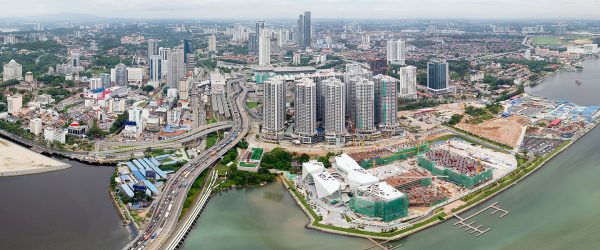
Increasing the contribution of industry to 13% of GDP within five years and to 15% in 2030 compared to 10.7% today is one of the main goals of the National Strategy for Industry.
According to a PwC announcement, the plan, in which the company also participated, includes an increase in industrial exports as a percentage of GDP to 15% within five years and to 20% by 2030 compared to 9.2% today
There is also a plan to increase the percentage of employees to 12% of the total over a five-year horizon and to 14% by 2030 compared to 8.2% today
The goal is to rise to 17th place in the European Innovation Index within five years and to 15th by 2030 from 20th place today.
According to the announcement of the company “PWC Greece, utilizing its domestic and international experience, developed the new National Strategy for Industry. In collaboration with Secretariat for Industry and all the involved units of the co-competent Ministries, the proposal of the National Strategy was designed, which was presented to the Government Committee of Industry on Tuesday 22-3-2022.”
Minister Adonis Georgiadis during the meeting of the Government Committee on Industry pointed out that “the National Strategy for Industry will be the main tool of industrial policy of our country for the next decade.” At the same time, he stressed the need to achieve the energy autonomy of Greek industry while emphasizing that the implementation of the objectives of the National Strategy contributes to strengthening the resilience of domestic industry, being the main pillar in the new era of Greek economy and social prosperity.
The General Secretary of Industry, Themis Eftychidou, stressed that this is the first substantial effort to formulate an Industry Strategy which is accompanied by an Action Plan with practical implementation and proposals of an emblematic nature that will significantly enhance the growth potential of the domestic industry.
The project
This project is implemented by the General Secretariat for Industry in collaboration with the Directorate General for Structural Reform Support (DG REFORM) which supports European states to plan and implement reforms as part of their efforts to support job creation and sustainable development .
The vision of the National Strategy is for the industry to gain a leading role in the transformation of the productive model of the country, investing in innovation, developing partnerships and upgrading the skills of human resources. The aim is to attract investments in modern productive activities, capable of participating in international value chains and securing modern and competitive products. In this way, the domestic industry is called upon to create, added value, sustainable and durable, without exclusions and for the benefit of Greek society.
According to the announcement of the company, as the contractor of the project, the role of PwC is crucial due to its experience from similar projects in Greece and abroad as well as its excellent cooperation with the productive bodies of the country. PwC ensures the building of trust between all stakeholders and contributes to sustainable development through the proposed Strategy, in a demanding socio-political environment. After all, this is a central strategic goal for PwC.
Mr. Leonidas Papaioannou, Managing Director of PwC Greece emphasizes: “In an ever-changing environment, the role of a resilient and sustainable industry is a key factor in the new equation that is taking shape. The 4th Industrial Revolution, geopolitical changes and the need to upgrade the skills of the workforce lead to the transformation of the production model. As contractors of this project, we seek the new strategy to be based on a realistic action plan which will be a point of reference for all involved, the state, the market and society.”
The 4 building blocks
The National Strategy for Industry is composed, equally, of four building blocks:
-The industrial ecosystems that are the pillars of Greek Industry and include all the organizations that are active at any stage of an industrial value chain.
-Specialized markets that are segments with significant growth potential, competitive advantage and high added value.
-The industrial base / industrial organization covering horizontal issues concerning industrial SMEs and bio-support and representation structures of engineering companies.
-The support structures and services that concern a series of factors that compose the business environment, the market and the society in which the industry operates.
The 153 business objectives
The National Strategy incorporates 153 operational objectives, which are linked to the strategic directions, while it also includes specific quantitative objectives that are milestones for successful implementation:
● increase the contribution of industry as a percentage of GDP to 13% within five years and to 15% in 2030 compared to 10.7% today
● increase in exports of industrial products as a percentage of GDP to 15% within five years and to 20% by 2030 compared to 9.2% today
● increase in the percentage of employees to 12% of the total over a five-year horizon and to 14% by 2030 compared to 8.2% today
● rise to 17th place in the European Innovation Index within five years and to 15th by 2030 from 20th today.
Finally, the business objectives are part of the National Industry Strategy and cover increasing competitiveness, innovation, digital and green transformation, human resource support and skills development, improving the business environment and ensuring its resilience. industry.
Latest News

Eurostat: Women and Youth Most Underpaid in Greece
In the EU 18.2% of women are low-paid compared to men, against 23% in Greece. A staggering 43% of young Greeks are low-paid—the second-worst rate in Europe.

Public Services in Greece to Go Under Review with New Rating Tool
Public services will receive their evaluation scores and feedback directly, fostering a system of accountability and continuous improvement.

Istanbul Earthquake – Greek Prof. Concerned Major Quake Yet to Strike
Responding to concerns over whether a potential major quake in Istanbul could affect Greece, Papazachos was reassuring: “The fault extends as far as Lemnos and the Northern Sporades, but it doesn’t rupture all at once. An earthquake in Istanbul doesn’t have the capacity to directly affect Greek territory.”

Greece 4th Most Popular Summer Destination for Europeans
Southern Europe remains the top choice for Europeans at 41%, though down 8% from last year, likely due to rising temperatures and climate concerns.

Easter Sales Performance and the Source of €4–5 Million in Losses
Easter retail sales were relatively weak this year, with the only "real winners" being the livestock farmers who had lambs to sell.

Hotel Foreclosures Continue to Plague Greece’s Islands
A surge in hotel foreclosures across Greece’s islands threatens small tourism businesses, despite booming visitor numbers and record-breaking travel in 2024.

Athens Launches Task Force to Safeguard Historic City Center
The new municipal unit will ensure compliance to zoning laws, curb noise, and address tourist rental issues starting from the Plaka district.

WTTC: Travel & Tourism to Create 4.5M New Jobs in EU by 2035
This year, international visitor spending is set to reach 573 billion euros, up by more than 11% year-on-year

IMF: US Tariffs Shake Global Economy, Outlook Downbeat
IMF slashes global growth forecast to 2.8% as U.S. tariffs create uncertainty and ‘negative supply shock

First Step Towards New Audiovisual Industry Hub in Drama
The project is set to contribute to the further development of Greece’s film industry and establish Drama as an audiovisual hub in the region














![Accor: Η βιωσιμότητα «κλειδί» για την ανάπτυξη και ανθεκτικότητα του ελληνικού τουρισμού [έρευνα]](https://www.ot.gr/wp-content/uploads/2025/04/thumbnail-90x90.jpg)

















![Οι αλλαγές που υπάρχουν στα φορολογικά έντυπα για τα εισοδήματα του φορολογικού έτους 2024 από ακίνητα [Γ’ Μέρος]](https://www.ot.gr/wp-content/uploads/2025/03/akinita-600x400.jpeg)






 Αριθμός Πιστοποίησης
Αριθμός Πιστοποίησης